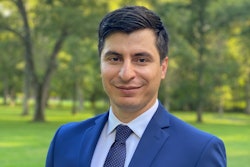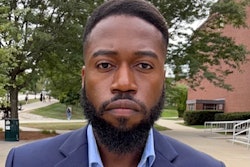Title: Assistant Professor of Higher Education, Department of Educational Leadership, College for Education and Engaged Learning, Montclair State University
Tenured: No
Age: 37
Education: B.A., Psychology, San Diego State University; M.A., Higher and Postsecondary Education, Teachers College, Columbia University; Ph.D., Urban Education Policy, University of Southern California
Career mentors: Dr. Alicia Dowd, Pennsylvania State University; Dr. Leslie Gonzales, University of Arizona; Dr. Julie Posselt, Dr. Royel Johnson and Dr. Estela Bensimon, University of Southern California.
Words of wisdom/advice for new faculty: “Don’t let the anxiety of tenure and promotion determine your faculty life. You are more than how you are being assessed, so find and do what brings you joy as a faculty member.”
Dr. Román Liera is a rising star in higher education, with a dedication to equity, innovative scholarship and student-centered learni Dr. Román Liera
Dr. Román Liera
“His research bridges theory and practice, addressing systemic inequities in higher education and equipping institutions with actionable frameworks like the Equity Scorecard in Higher Education (to train practitioners and faculty on being equity minded),” says Dr. Blanca Elizabeth Vega, an associate professor, educational leadership at Montclair State University.
Liera, who grew up in Southern California, says his experiences as an undergraduate set the foundation for the work that he does. At the time, he didn’t know how to articulate what he was feeling, but as he gained additional knowledge, his academic focus became clearer. He went to an under-resourced high school. After graduating, he studied at Pierce College (a community college), majoring in psychology because he wanted to become a high school counselor. Liera then transferred to San Diego State, and although his overall experience was positive, it was his first time in an environment with so many white students. After sharing his feelings of not belonging with a Hispanic psychology professor, the professor introduced Liera to the McNair Scholars Program, a federally funded program that helps first-generation, low-income, and underrepresented students prepare for graduate school and doctoral students. “I was asking questions about the structure. I was asking questions about the culture, how it created spaces that excluded us,” says Liera. “That’s how I came into my work around racial equity and organizational change.”
While the Hispanic Serving Institution designation may increase access to higher education, it does not necessarily mean that these institutions are creating environments that foster greater inclusion for Latinx students, says Liera who sees opportunities for assessment of policies and practices that can lead to positive change.
“In terms of why colleges and universities are racialized entities or organizations, it’s because of the practices, the policies, the norms or even our routines that oftentimes go unquestioned,” he says. “It means that I’m looking at how we reproduce racial inequalities through these practices and norms. The big one that I’ve been looking at is hiring.”














